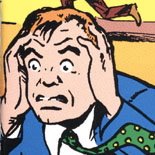They Also Serve...
Off topic, I know, but I assume we are all geeky enough- erm, sorry Beau Smith -big enough fans of fantasy fiction to have all read Harry Potter, yes? Good.
Two characters I've always wanted to know a little more about are Hermione's parents, the Grangers. Especially compared to Harry's and Ron's families, we know very little about them. We know they're Muggles, and come from a long line of Muggles. We know they're both dentists, and would rather have Hermione solve her buckteeth through orthodonture than magic. And we know they are comfortable enough with the world of magic to have gone school supplies shopping with the Weasleys at Diagon Alley. That's it. Heck, we know more about Neville's parents than we do about the Grangers.
Now, I don't need a thousand page saga about how they met and fell in love in dental school, scrapped together the funds and opened a small practice outside of Cambridge with nothing more than two degrees and a dream, and eventually reached a level of middle class security that allowed them to raise a bright and gifted child. But maybe just a scene of them sitting with the Arthur and Molly having a cuppa, talking about the final year.
Because I want to know what their reaction is to the world of magic. Frankly, the only Muggle reaction to magic we ever see is the Dursleys' utter disdain for the whole thing, but the Durlseys are horrid people anyway. What is the sane, normal parents reaction to finding out witches and wizards real and their very daughter is one?
Are they proud of their brilliant daughter? Do they know that she is probably the most talented witch of her age? Do they have a "My Child is on the Honor Roll of Hogwarts Academy" bumper sticker on their car? Are they scared for her? When she was paralyzed in Year 2, did they demand she be pulled from the school? Shouldn't they have? Did they know she was working 28/7 during Year 3 and exhausting herself? The Dursleys tell their neighbors that Harry goes to a school for the criminally insane. Where do the Grangers tell their friends that Hermione goes to school?
It's one thing to be told that you have great power and a special and dangerous destiny. What is it like to be told your child is the one with the power and the danger?
To relate it back to superheroes, what if you found out your son was a mutant, and you weren't a prejudiced bastard? There's a nice scene in the early '90s X-Men cartoon (which is STILL my preferred interpretation of the X-Men) where Beast looks over a photo album which includes a picture of him, at his graduation, in his cap and gown and blue fur, hugging his normal looking dad. Along with a funny photo of young Hank McCoy playing little league, it said so much about the kind of family he grew up with. Unlike so many mutants, Hank never had to run away from home. He had a fairly normal childhood despite the fangs and claws, and his parents supported him and encouraged his academic career (he is DOCTOR McCoy, after all).
One of my minor complaints about the death of Robin's father, Jack Drake, in Idenity Crisis, was that in Robin's own title, Bill Willingham introduced the idea that Jack Drake knew his son was a superhero and had JUST accepted that, despite the danger, being Robin was a good thing for Tim Drake. And that was a dynamic that I wish had been explored more. Too bad.
I guess I'm just fascinated by the Alfreds, the Mas and Pas Kent, the Mary-Janes... those mundane people who have to face the fantastic, but can only do so from the sidelines through their loved ones. Those who worry, but also embrace and support where they can. Who occasionally have to kick a little butt themselves when the fantastic crashes through the door.
Is it any surprise that Samwise was my favorite hobbit?



2 comments:
I agree that not enough attention is paid to the normals. A few months ago, I suggested a miniseries or a regular back up story for Detective Comics called "The Pennyworth Chronicles," in which Alfred would tell bedtime stories to a young Bruce Wayne about his life as a spy and an army medic and an actor, etc. More importantly, though, would be the imagery we get of Alfred caring for a young man who's family was slaughtered before his eyes and the deeper understanding we'd get of their relationship.
I keep hyping the Ultraviolet character over at Ye Olde, but she isn't really the main character.
The story is about a kid who, in the end, winds up becoming her Alfred. I'm having a lot of fun writing about the typical superhero universe of DC or Marvel from an average eleven year old kid's perspective, juggling homework and a bratty sister with supervillains attacking his school.
There is something very enjoyable about scenes where he runs into superheroes while taking out the garbage.
I wrote an entire novel in blog form over the course of about a year and a half about exactly this kind of thing:
Sliced Bread 2
Post a Comment